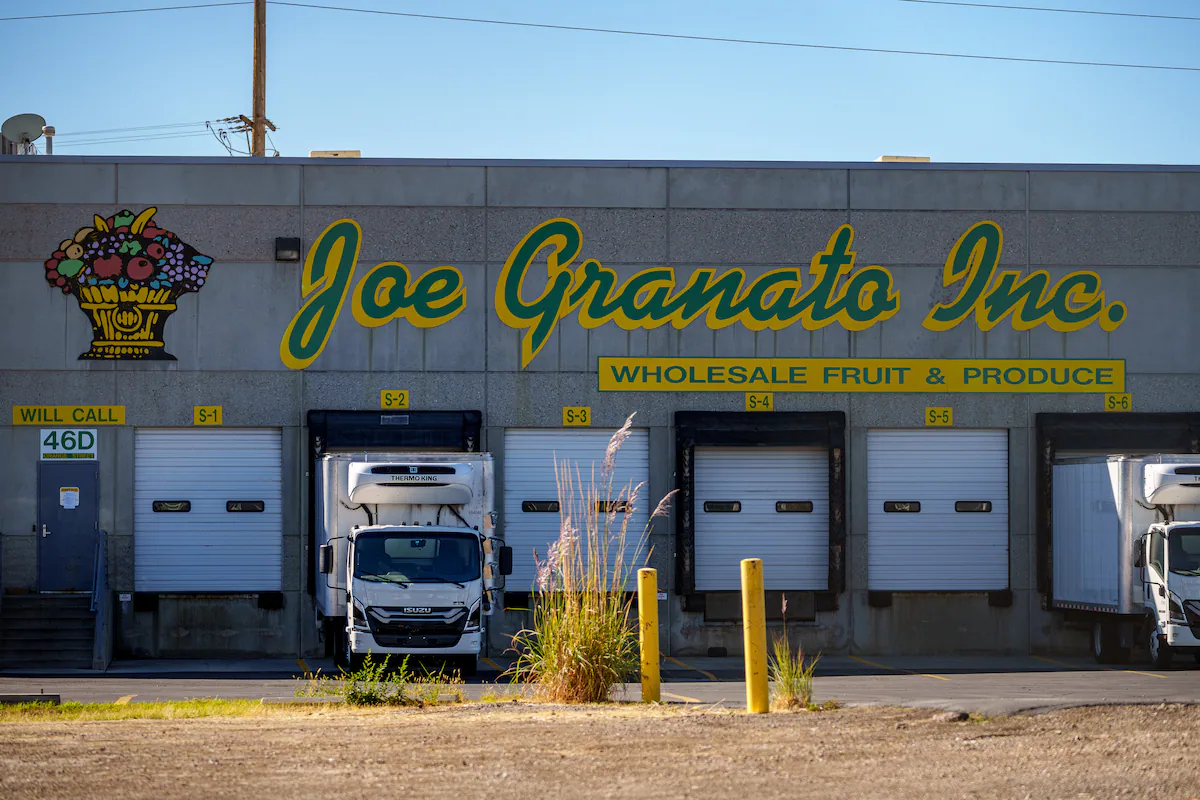
Michael McCarty was 14 when he began working for his family’s produce business — a Salt Lake City mainstay started by his grandfather, Joe Granato, back in 1964.
Joe Granato Produce has been a family affair since then, with nearly every relative pitching in at some point to help get fresh fruits and vegetables to schools, restaurants, hospitals and care facilities across the Wasatch Front, said McCarty’s father, Marty Granato.
But after 61 years in operation, the Salt Lake City-based distributor shut its doors on Monday.
The decision was not made lightly, McCarty said; it was one that had been coming for nearly a decade as the business began to decline.
McCarty said he notified his clients that they would need to find another supplier, as he will no longer be able to fulfill his contracts.
The Salt Lake City School District, for example, is a longtime customer, and the school board had just approved the latest requisition for nearly $300,000 for fresh produce for student meals this school year. The district is now transitioning to another local supplier, Nicholas & Co., a spokesperson said.
Trying to save what his family built
Joe Granato was born in Utah to Italian immigrant parents; his older brother established the Frank Granato Importing Company in Salt Lake City in 1948. (Frank’s family continues to run it as Granato’s Gourmet Market.) Joe Granato died in 2003.
Marty Granato decided it was time to sell the family produce business in 2021 — but his son couldn’t let it go. Hoping to keep the beloved legacy alive, McCarty bought it from his father.
The business was struggling but he was ready to give it everything he had.
“Not wanting to see the business close after decades of taking care of the Salt Lake City area or the Wasatch Front, I thought I can get in and save it from its bad place,” McCarty said. “It was a bigger mountain to climb than I had ever anticipated.”
Running an independent produce company has gotten harder over the years, McCarty said.
As large corporate wholesalers moved into Salt Lake City and increased the competition, and major restaurant chains turned to large purchasing cooperatives for supplies, Joe Granato’s profit margins shrank — even as overhead and payroll costs continued to climb, McCarty said.
“We just couldn’t keep up with it,” he said.
Over time, mounting expenses pushed the business into debt. His worry about making payroll was the last straw.
“That’s what made the decision for me that I needed to close my doors,” he said, “because I didn’t foresee that I could go another week and still be able to pay those employees their wages.”
On Friday, Produce Alliance, LLC, an Illinois-based company that manages over 150 specialty produce distributors, filed a lawsuit against Joe Granato Produce, alleging nearly $1.9 million in invoices have not been paid for produce purchased between March 5, 2024, and September 16, 2025.
The lawsuit was the “final dagger,” McCarty said.
Times were different back then
Both Granato and his son have witnessed firsthand how much the produce business has transformed over the past few decades, and Joe Granato Produce is not the only independent supplier that has been steadily edged out by corporations.
“When my dad started, there must have been 25 (independent) produce companies in Salt Lake City,” Granato said. “And now today, there might only be like three or four.”
His father, Joe Granato, got his start in the produce business at Pacific Fruit and Produce Co. — a Seattle-based wholesaler founded in the 1920s — after serving in the U.S. Army during World War II.
At 44, Joe Granato started his own wholesale fruit and produce warehouse at the former Growers’ Market in Salt Lake City, taking orders from independent grocers.
What began as a one-man operation quickly grew, as he brought on a few delivery drivers and started supplying more businesses along the Wasatch Front.
In the 1960s and 1970s, many of the buildings that made up the Growers’ Market were torn down and replaced. The Sheraton Hotel now stands where the market used to be, according to the Salt Lake County archives.
By the mid-1970s, the company moved into a 10,000-square-foot facility at 551 S. 600 West.
Then, in 2000, Joe Granato Produce opened a new warehouse at 46 S. Orange Street near the city’s downtown, where it operated until its sudden closure this week.
Granato has fond memories of its heyday.
“I had a lot of fun with it, because I used to deal with the independent grocery stores,” he said. “They used to have produce buyers that used to come to your place, look at your product, look at the neighbor’s product. They’d decide what they wanted to put in their stores, then they’d have you deliver it.”
At first, Joe Granato Produce sourced its food only from Utah. But around 1977, after Marty graduated high school and joined the business full time, he saw an opportunity to compete with bigger players. He pushed to start buying produce out of California.
“Then I started selling to people in the produce market,” he said. “I started selling [to] Hill Air Force Base, I started selling [to] grocery stores, you know, anything that I could get a hold of.”
But then, Granato said, the big purchasing cooperatives were on the rise. They began offering independent produce wholesalers the opportunity to join together to supply national chain restaurants. This helped Joe Granato Produce expand beyond Salt Lake City, and for a while, it worked well, he said.
The arrangement was simple: the cooperative would connect local produce wholesalers with national chain restaurant accounts. In return, the wholesalers paid the cooperative a fee of about 50 cents per package for the chance to distribute to those clients, Granato explained.
The industry says that it offers its clients an assured supply of food or other goods, helping them stabilize costs and manage risks.
“But as the buying groups got bigger,” Granato said, describing his experience, “they decided that they wanted to make more money.”
On top of the distribution fee, the cooperatives began requiring wholesalers to purchase produce through suppliers affiliated with them, he said.
Over time, the arrangement stopped being profitable, Granato said, but his business couldn’t afford to walk away from it, either.
“They got so big that they were controlling all kinds of chain restaurants, and if you wanted the business, then you would have to do what they said,” he explained. “That’s where the deal fell down.”
Compounded with the rising costs of goods, these forces ultimately made survival impossible, McCarty said.
“It’s just a matter of time before you either you dig yourself a hole that you can’t get out of, or you just have to shut your doors because you don’t have enough customers to keep the business running,” he said.
While the closure of the longtime family business is disheartening, Granato said it felt inevitable.
Still, after his family’s 61 years in the game, he can’t help but wonder: “Is this really where it ends up? Where an independent company can’t even service the people? It’s just big business now.”



